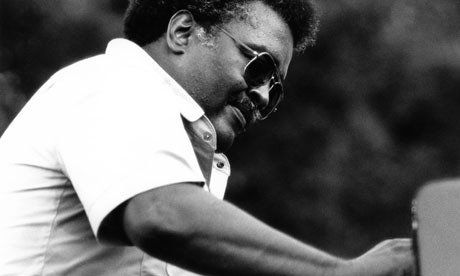
Ray Bryant in 1985. ‘Ray had a very sensitive feeling, a good touch and he could swing’.
The distinguished African-American pianist Ray Bryant, who has died aged 79 after a long illness, became a fixture of the jazz mainstream after enjoying a measure of chart success, mostly as the 1950s came to an end. Like many colleagues, he pointed to the grounding his family gave him for a versatile career as soloist, accompanist and composer.
His mother played the piano in church in his native city of Philadelphia, his elder brother, Tommy, was an accomplished bassist, and his younger brother, Len, is a singer and drummer. Their sister, Vera Eubanks, is a pianist and organist specialising in gospel music. Her three sons have gained fame in their own right, with the trombonist Robin Eubanks best known for his association with the bassist Dave Holland; Kevin, a guitarist, was, until recently, the bandleader on The Tonight Show with Jay Leno on NBC television; and the trumpeter Duane Eubanks is a familiar freelance player on the New York scene.
Ray began classical piano studies at the age of six, and played that instrument in church, and the double-bass and tuba in his school band. "The greatness of jazz, which encompassed blues, gospel and other styles, always attracted me," he said. By his early teens, he was firmly in the jazz camp, having made his first (unreleased) recordings on piano at the age of 14 with Jimmy Johnson's band. The local tenor-saxophonists John Coltrane and Benny Golson were both on the recording, as was Tommy, and Ray became involved in the very active Philadelphia modernist scene.
His first professional job was with the bandleader Mickey Collins, who heard him taking his musicians' union entrance exams and hired him on the spot. He was still only 14. After a few years with Collins, Bryant joined Tiny Grimes and His Rocking Highlanders, an African-American rhythm and blues group who sported the full kilt and tam o'shanter, recording with them in 1949. He spent a year in Syracuse, New York state, playing solo engagements, leavening his initial Teddy Wilson and Art Tatum influences with a rumbling, two-handed gospel and blues undertow that became an enduring aspect of his style.
Bryant's breakthrough came in 1953, when he was taken on as house pianist at the Blue Note, then Philadelphia's leading jazz club. Visiting artists such as Charlie Parker, Lester Young, Sonny Rollins and Miles Davis encouraged him to seek his fortune in New York, and once there he began to record regularly for labels such as Blue Note and Prestige, including dates with Davis and Rollins.
It was for Prestige that he recorded most frequently, backing every significant modernist of the day during the late 1950s. It was also then that he demonstrated his ability to bridge the jazz generations, happy to double at the Metropole cafe on Seventh Avenue in the afternoons with such mainstream stalwarts as the saxophonist Coleman Hawkins and the trumpeter Roy Eldridge, before playing hard bop at night with his contemporaries Golson and the trumpeter Donald Byrd at the Five Spot. He saw nothing unusual in this, pointing out that he had also played Dixieland jazz at Billy Kretchmer's club in Philadelphia for a couple of years.
During this hugely busy period, Bryant acted as the singer Carmen McRae's accompanist for two years, performed briefly with Dizzy Gillespie's bands and joined the drummer Jo Jones's trio, with Tommy alongside. He then, largely at the instigation of the impresario John Hammond, formed his own trio, recording regularly for Columbia and often composing his own material, including the widely recorded Cubano Chant (1956) and the hit singles Little Susie (1959) and The Madison Time (1960), a novelty piece linked to a dance craze. In 1967 he found chart success with his version of Bobby Gentry's Ode to Billie Joe.
It was usually in a trio, duo or solo context that Bryant chose to perform and record for the remainder of his career, travelling regularly to Europe and playing at festivals including Brecon, with the guitarist Russell Malone, and appearing in London at Pizza Express and the theatre at University College school, Hampstead, now the Lund theatre. The veteran tenor-saxophonist Hal Singer, with whom Bryant recorded in 1960, said recently: "Ray had a very sensitive feeling, a good touch and he could swing." These qualities were still very much in evidence on his final solo concert recording, In the Back Room (2008).
Bryant is survived by his wife, Claude; his son, Raphael; a daughter, Gina; three grandchildren; and Len and another brother, Lynwood. Tommy died in 1982.
• Ray (Raphael Homer) Bryant, jazz pianist, born 24 December 1931; died 2 June 2011
No comments:
Post a Comment